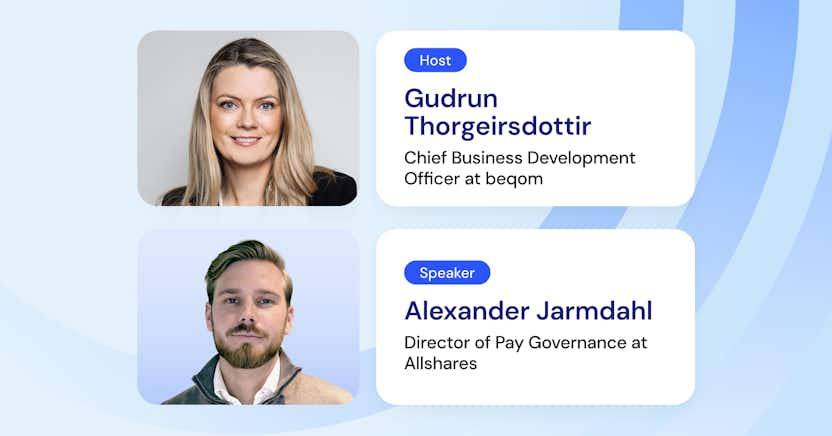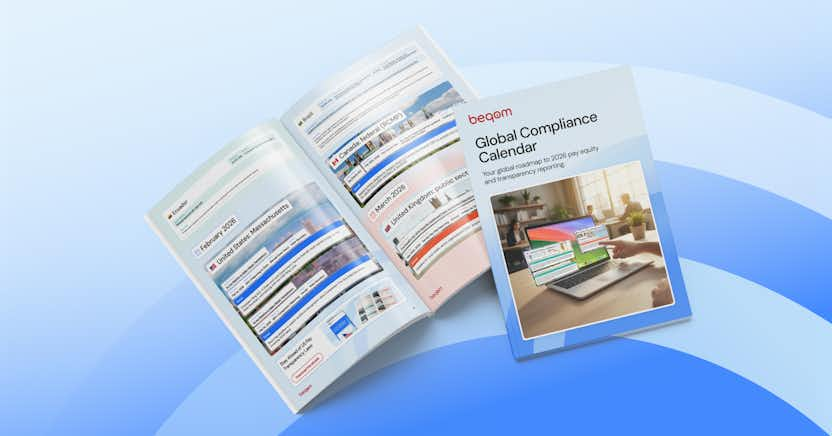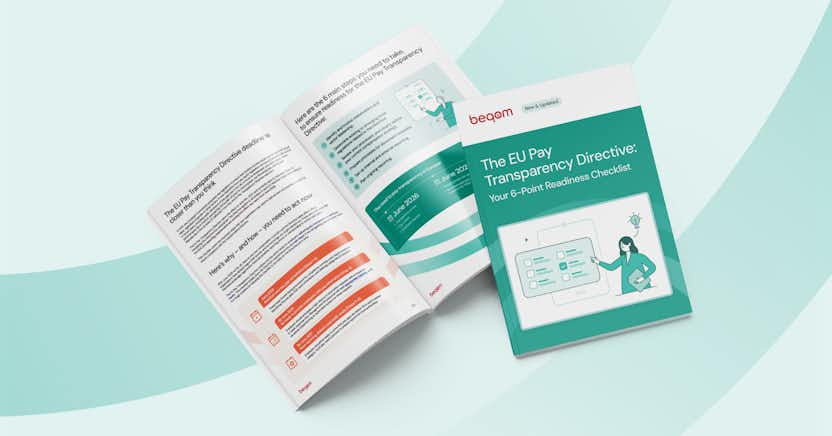The Power of AI for Compensation Management: How it Can Improve Employee Retention and Productivity

Learn more about the following beqom products
Compensation management is an essential aspect of human resource management for businesses as it involves designing, implementing, and maintaining a fair and competitive compensation package for employees. Whether you are talking about salaries, bonuses, or other short-term and long-term incentives, effective compensation management can have a significant impact on employee retention and productivity.
When employees feel that they are being paid fairly and competitively, they are more likely to remain with the company and be motivated to perform their best. On the other hand, compensation that is perceived to be unfair or inadequate can lead to low morale, high turnover rates, and a loss of talented employees. Artificial Intelligence (AI) is a new tool that can help HR optimize total rewards to achieve its talent goals.
AI-powered compensation management can help companies to efficiently and effectively attract and retain top talent, improve productivity, and increase employee satisfaction. Let’s take a look at how you can apply AI to transform your rewards management.
< p>AI is a rapidly growing technology that is being used in compensation management to automate and streamline processes. AI can help companies analyze large amounts of data to make informed decisions about compensation packages, ensure fairness and consistency in pay, and identify areas for improvement. It can also provide insights and recommendations for managers to make better decisions about promotions, raises, and bonuses.The challenges of compensation management
Compensation management is the process of designing, implementing, and maintaining a fair and competitive compensation package for employees. Its objectives are to attract and retain top talent, motivate and reward employees for their performance, and align compensation with organizational goals and values.
Traditional compensation management methods often involve manual processes, such as paper-based forms and spreadsheets, which can be time-consuming and prone to errors. Other challenges include:
- Difficulty in gathering and analyzing compensation data to make informed decisions about pay.
- Bias in compensation decisions, conscious or unconscious, resulting in pay disparities based on factors such as gender or race, rather than skills or contribution.
- Lack of transparency in compensation decisions, which can lead to perceptions of unfairness or bias.
- Inconsistencies in pay across departments or roles, which can create dissatisfaction and lower morale.
- Difficulty in keeping pay scales in line with the job market, for each geographical area and type of job.
What are the core capabilities of AI?
AI can excel at compensation management tasks because it can process and analyze very large amounts of data in real-time, at a scale that is simply impossible for humans to do. Additionally, AI can learn from past data and improve its performance over time, making it more accurate and efficient. Here are some specific capabilities of AI that, as we will see, are useful in compensation management:
Data processing and analysis. AI can process large volumes of data much faster than humans, and it can identify patterns and insights that may be missed by human analysts. This makes it particularly useful for analyzing large data sets related to compensation, performance, and other HR metrics.
Machine learning. AI can learn from past data and improve its performance over time. This means that it can become more accurate and efficient as it processes more data, making it a valuable tool for identifying trends and making predictions about compensation and performance.
Real-time feedback. AI can provide real-time feedback to managers and HR teams, helping them to make informed decisions and take corrective actions when needed. This can lead to faster and more effective responses to performance issues and other HR challenges.
Customization. AI can be customized to meet the specific needs of a company, department, or team. This means that it can be tailored to identify the most relevant performance metrics, benchmarks, and compensation strategies for a given organization.
These capabilities make AI a powerful tool for improving the accuracy, efficiency, and effectiveness of compensation management.
How AI can improve compensation management
By leveraging AI technology, businesses can automate and streamline compensation processes and analyze large amounts of data to provide insights and recommendations. AI can help large businesses manage compensation more efficiently, fairly, and compliantly, improving compensation decisions, employee engagement, retention, and recruitment. AI also can help companies stay competitive in the labor market by providing up-to-date information on industry standards and trends. Some of the biggest benefits of leveraging AI include:
Automation and accuracy. AI can automate compensation management processes by using algorithms to manage data input, calculation, and reporting. This can reduce errors and improve accuracy by eliminating the need for manual data entry and minimizing the risk of human error, ensuring that rewards are calculated consistently and fairly across the organization. For example, AI-powered software can automatically calculate bonuses based on pre-defined performance metrics, reducing the likelihood of mistakes or bias in bonus decisions.
Data-driven pay decisions. AI can analyze compensation data to identify patterns and provide insights and recommendations for better decision-making. For example, AI can analyze data from multiple sources, such as sales data, customer feedback, and employee performance metrics, to identify patterns and make recommendations on which employees are most deserving of bonuses. From a strategic perspective, it can analyze employee performance data, market trends, and industry benchmarks to identify patterns and make recommendations to improve compensation strategies. It can build appropriate pay ranges, offer individual compensation recommendations, and create new job offer comp packages. Better pay decisions mean better recruiting, higher retention rates, and increased productivity.
Analyzing and aligning rewards to goals. AI can help companies set more meaningful performance metrics and goals by analyzing historical data and industry benchmarks. This can ensure that bonuses are aligned with organizational goals and values and that employees are incentivized to perform in ways that drive business success.
Benchmarking to stay competitive. AI can help companies ensure that their compensation packages are competitive and aligned with industry standards by providing up-to-date information on market trends and industry benchmarks. This can help companies benchmark their compensation packages against competitors and ensure that they are offering competitive salaries, bonuses, and benefits. AI can also help companies stay informed about changes in labor laws and regulations, ensuring that they remain compliant with legal requirements and avoid costly penalties.
Optimized compensation strategies. AI can help companies optimize their compensation management strategies by reducing errors, analyzing compensation effectiveness, providing data insights and recommendations, and ensuring competitiveness and compliance with industry standards. By analyzing data on employee turnover, engagement, and performance, AI can help companies identify areas for improvement in their rewards programs and ensure that they are achieving the desired outcomes. This can lead to lower costs, improved retention rates, higher productivity, and a more engaged and satisfied workforce.
But, is AI really necessary?
We already do all those things, you might say—benchmarking, using performance metrics to calculate bonuses, analyzing compensation effectiveness—so why do we need AI?
While it is true that the above tasks can be done to a degree by manual methods or using a rules-based calculation engine, AI can add significant value to the process by improving accuracy, speed, and efficiency, while enabling cost savings and optimal compensation strategies.
AI, with its machine learning algorithms, can distill useful information from massive amounts of data, finding patterns and analyzing at a level and speed not possible with conventional means. It can provide real-time insights to enable fact-based decisions, reduce bias and risk, and promote fairness in the workplace.
AI can help with setting meaningful goals, ensuring competitive pay, and tracking program effectiveness. In a myriad of ways, it can improve HR efficiency, boost productivity and profitability, and improve employee satisfaction.
AI can help take your operations and performance to the next level.
AI-powered compensation is happening now
Using AI to drive compensation strategy and processes is no longer just nice to have, it is fast becoming a necessity for a business to survive. Read a use case about how one global company is already using the AI-enabled compensation capabilities of beqom to strengthen its employer brand.
Contact beqom to find out how to put AI to work to manage compensation and performance in your organization.








